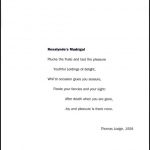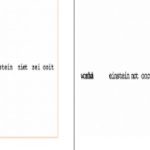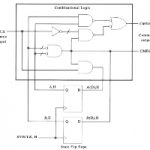“Is this for real? Is that a stupid question?”: A Review of Dennis Cooper’s The Sluts
Megan MilksDennis Cooper's disorienting novel, The Sluts, complicates reader expectations about subjectivity and identity. As a result, Megan Milks notes that it "is either the most honest or the most dishonest literature I have come across."
Epic at the End of Empire
Joseph TabbiIn The American Epic Novel, Gilbert Adair presents a "State-of-the-Empire address" that interrogates the epical form in a time where authors no longer talk of writing "The Great American Novel." As Joseph Tabbi finds, such an exploration goes beyond expanding the canon and presents "a new, compelling context for 'the literary' itself."
A New “Gospel of the Three Dimensions”: Expanding the Boundaries of Digital Literature in Jörgen Schäfer and Peter Gendolla’s Beyond the Screen
Lisa Swanstrom
Just when you thought you were used to electronic literature, this critic makes the case for "beyond the screen" with a review of Jörgen Schäfer and Peter Gendolla's book of the same title, focusing on "transformations of literary structures, interfaces and genre."
Anomalies
Rob SwigartFrom the heavens to the stars, the number three has often been tied to the occult. Carrying on this tradition, Rob Swigart has brought together three books that investigate the anomalous, address the unexplained, and answer the impossible. The truth is in here.
Due Diligence
Stacey OlsterToo much about too little, and too little about too much. Reviewing the new critical collection Against the Grain: Reading Pynchon's Counternarratives, this critic finds evidence of overproduction in the "Pyndustry."
A Review of Brian Lennon’s In Babel’s Shadow: Multilingual Literatures, Monolingual States
W. Gilbert Adair
Literature joins the living dead. A critic illuminates Brian Lennon's "scene" of literature today: both suspended and emergent in the world system.
“With each project I find myself reimagining what cinema might be”: An Interview with Zoe Beloff
Jussi Parikka
Jussi Parikka interviews artist Zoe Beloff about her relationship to the emerging set of interdisciplinary theories and methodologies known as media archaeology. In way of response, Beloff discusses some past works, including: Lost (1995), Shadow Land (2000), Claire and Don in Slumberland (2002), Charming Augustine (2005), The Somnambulists (2008), and The Dream Films (2009).
The Maypole is the Medium: A Review of The Networked Wilderness by Matt Cohen
Madeleine Monson-RosenFrom early modern texts to "publishing events," Madeleine Monson-Rosen's review follows Matt Cohen's exploration of the "networked wilderness." It turns out that the English colonists and native Americans were already information theorists, centuries before cybernetics emerged at MIT.
“You are cordially invited to a / CHEMICAL WEDDING”: Metamorphiction and Experimentation in Jeff Noon’s Cobralingus
Andrew Wenaus
How does a sample of de Quincey's Confessions of an English Opium Eater give birth to a mutant, six-fingered hand? This essay articulates the logic of Noon's 2001 experiment in constrained writing, which concretizes the play of signal and noise, pattern and randomness, in the flow of information. In the process, the critic suggests, Noon dramatizes how printed texts rupture and reassemble when they are transferred to electronic media.
How to Fail (at) Fiction and Influence Everybody: A Review of Penthouse-F by Richard Kalich
Christopher LeiseRichard Kalich's latest protagonist is Richard Kalich, but one critic views this postmodern occupation of the novel as an opportunity - even an encouragement - to forget about him.
See the Strings: Watchmen and the Under-Language of Media
Stuart Moulthrop
Engaged in his own kind of structured play, Stuart Moulthrop uses the concept of "under-language" to explore the boundaries, gutters, masked intentions, and hidden meanings of Moore and Gibbons' Watchmen, while simultaneously using the graphic novel to provide an equally complex, over-determined rendering of the term.
Review of Stacy Alaimo’s Bodily Natures: Science, Environment, and the Material Self
John Bruni
Beginning his review by reflecting on the book's cover art, John Bruni speculates that a punk aesthetic runs throughout Alaimo's posthuman environmentalism. Providing brief treatments of each chapter, he argues that the book's trans-corporeal understanding of the relationship between bodies and places disrupts "the very heart of what we know about ourselves."

